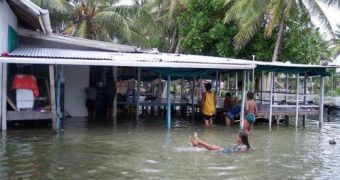The first nation victim of the global warming seems to be a micro-country in the middle of the tropical Pacific, made of 9 atoll islands and inhabited by 11,000 people: Tuvalu.
"In geological time, all the atolls are condemned to disappear. But the climate change can accelerate this" said the French climatologist Herve Le Treut.
Taking into consideration the rhythm at which the ocean level rises due to the polar ice melting, the life of most atoll archipelagos will not prolong for more than 50 years. This can be also hasted by the El Nino-La Nina cycle.
"During the period corresponding to El Nino, the tropical southwest Pacific loses mass, which is translated in Tuvalu in a regress of the sea level of 15-20 cm (6-8 inch). During the La Nina phenomenon, the process is reverted and produces in the same place a rise of the sea level of the same magnitude," said the oceanographer Thierry Delcroix. But with the global warming, La Nina gets even more powerful and could engulf Tuvalu together with the neighboring islands of the Kiribati.
The general rise of the sea level has accelerated in the last 15 years, "from one mm annually to 3 mm per year" said Christian Le Provost, of the Laboratory of Geophysical and Spatial Oceanography Studies of Toulouse (France).
It is certain that all deltas are menaced, from Camargue to Bangladesh (Gange-Brahmaputra). The solution for Tuvalu would be the ratification of the Kyoto protocol, which intends to decrease the emissions of the greenhouse effect gases. But even the neighboring Australia, not to mention US, does not ratify it.
"These islands are condemned to disappearance. In theory, the growth of the coral should accompany the rise of the sea level and this way, the archipelago relief would rise, too. But the warming of the ocean is killing the coral", explained Le Treut.
When the sea is agitated, waters can reach 3.2 m (11 ft) over the normal, flooding the Tuvalu settlements.
Many tombs had to be replaced and many islets have disappeared. The inhabitants are trying to adapt to the state of permanent flooding by installing their houses over piles. New Zealand already accepted to receive the future "global warming" refuges from Tuvalu.

 14 DAY TRIAL //
14 DAY TRIAL //